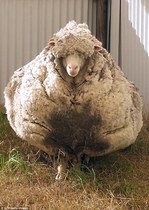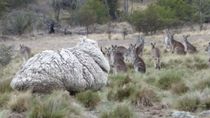Hello all, hope all are tickety boo, good wishes to those that aren't.
Now, just heard an item in the radio about wool.
I used to keep a small clock (50 max) of sheep, and I am struggling to understand the anti wool thing, as sheep don't die to provide it, in fact they benefit from providing it, i.e. being shorn. 
Also to be honest, I don't quite get the not wanting leather shoes. Yes, I appreciate that an animal has to die to provide the leather, but do "plastic" shoes not make more damage to the environment?
I understand that bamboo is a good environmentally friendly option for clothing etc, but apparently the production process is not!
Seems to me that we are between a rock and a hard place, but still don't get the vegan anti wool thing.
Gransnet forums
Ask a gran
Veganism, genuine questions.
(170 Posts)Damn tablet, flock, not clock! Grrrr.
Me neither.
I have my hair cut regularly and I'm sure most people do, even if they like to wear it long.
The same for a sheep. I think I posted a picture of an escapee which had such a huge fleece he could hardly walk, poor thing.
Wearing wool is better than wearing acrylic which is polluting our rivers and seas with plastic fibres.
I just don't get it …..
Nor do I get the 'not eating any fruit or vegetable that has been pollinated by bees' that was doing the round not long ago.
Surely it is beneficial to us and to bees to eat the fruit that results from their pollination - and without those plants or trees the bees would have an even harder time surviving.
It seems illogical to me.
Phoenix I read an article earlier today about a large on-line fashion company banning wool.
Surely it is better to use natural fibres, man-made cause damage to the environment during manufacturing and the micro fibres remain for years and continue to cause damage.
If they are to start using bamboo surely the farming of it and turning it into useable fibres will need copious amounts of water and maybe lead to deforestation in parts of the world.
Thank you Jalima so glad that it's not only me.
As for not eating honey, well! Let alone pollinated plants, what are they going to do, follow the insects (because it's not just bees!) around and check?
Let alone pollinated plants, what are they going to do, follow the insects (because it's not just bees!) around and check?
Here he is again, with some startled roos
An overgrown Australian sheep affectionately named Chris has set a new unofficial world record following a hair cut from five shearers.
Welfare crews warned it risked death because it was so woolly from living in the wild for several years.
More than 40kg (88lb) of wool was removed in what the RSPCA says is the heaviest wool haul from one shearing.
I think we should leave the bees enough honey to sustain them and not give them sugar - we needn't take it all, but what should we do with the rest?
Perhaps leave it for Winnie the Pooh.
This is a short copy n paste
As a vegan, one of the questions that I get a lot from perplexed people concerns wool. Many people have an idyllic image of happy sheep roaming green hills, but as with any industry that profits from animals, money always comes before the animals’ well-being. Below are some of the most shocking facts about the wool industry:
Mulling
The world’s largest exporter of wool is Australia, where mulesing is a common practice. This barbaric procedure—in which farmers carve huge chunks of skin and flesh from lambs’ backsides using tools resembling gardening shears in a crude attempt to prevent a parasitic infection called “flystrike”—is typically performed without any painkillers.
Shearing
Shearers are usually paid by the sheep, not by the hour, which encourages fast work without regard for the welfare of the animals. Sheep commonly suffer from injuries ranging from nicks to complete amputation of their udders, ears, penises, and other body parts. Says one eyewitness: “[T]he shearing shed must be one of the worst places in the world for cruelty to animals … I have seen shearers punch sheep with their shears or their fists until the sheep’s nose bled. I have seen sheep with half their faces shorn off …”
Export and Slaughter
When their wool production begins to decline, most sheep are killed for meat. Many are sent on a long journey in a severely crowded, multitiered ship to countries that have few if any animal welfare laws or regulations. These sheep—millions every year from Australia—are often slaughtered by having their throats cut while they’re still conscious.
If you are genuinely interested
www.vegansociety.com/go-vegan/honey-industry
Just because there needs to be higher standards which should be maintained does not mean that sheep shearing is not essential for the well being of the sheep.
If the sheep were just left to go free instead of being shorn or their meat used for consumption their numbers would increase drastically and they would suffer immensely.
What would you suggest wearing instead of wool then please crystaltipps? More and more plastic - which will just finish off this earth?
I do know a sheep farmer in Australia, and do not recognise the scenarios of your post crystal. They are very concerned for all aspects of animal welfare.
Thank you for your post, crystaltipps
As mentioned, I used to keep sheep. Flystrike was something that we were very aware of, hence shearing (which is not just done to harvest wool) and dagging, which involved clipping the wool away from the "back end", to keep sheep fly free, and enable us to see what was "going on".
We planned our lambing around the old ways, "ram in on Bonfire Night, lambs out April Fools" Obviously, those aren't accurate dates (if only!) A lot of sheep farmers go for earlier lambing times in order to get their lambs "finished" i.e. ready for being on the supermarket or butcher's shelves for Easter.
I remember going round to my daughters and finding her in tears due to reading about how Ugg boots are produced.
She never wore hers again.
My BiL is a sheep farmer in Australia and I have visited on several occasions never seeing the scenarios presented by Crystaltipps. I don’t doubt that mistreatment may go on, but personal experience says it’s the exception rather than the rule.
Wool isn’t “essential” btw.
Some surgeons butcher their patients and condemn them to a life of pain and, sometimes, disability
. Is that a good reason for banning surgery?
If everyone became vegan today, what would the world be like in , say, 20 years time? (Serious, interested question, not intended to be confrontational)
Boring?
Seriously lacking in countryside management, phoenix
I suspect the source from which Crystal copied that description was a teeny bit biased. How on earth could "carving huge chunks of skin and flesh from lambs’ backsides" be expected to prevent fly strike? Flies are attracted to mucky bums and to open sores to lay their eggs in, so carving chunks off an animal would make it more likely that bluebottle maggots would eat at the flesh! Whoever reports witnessing this barbaric practice is more likely to have seen the results of fly strike. Maybe the maggots were being removed!
According to my farmer son-in-law, much of the poorer countryside here in Scotland would be overrun with bramble and weeds and much of the better land would be barren unless copious amounts of chemicals and pesticides were used. He's an arable farmer so doesn't have stock but of course plenty of his fellow farmers do.
My BiL is a sheep farmer in Australia and I have visited on several occasions never seeing the scenarios presented by Crystaltipps. I don’t doubt that mistreatment may go on, but personal experience says it’s the exception rather than the rule.
Well, here are the standards that should be adhered to:
www.animalwelfarestandards.net.au/files/2011/01/Sheep-Standards-and-Guidelines-for-Endorsed-Jan-2016-061017.pdf
If PETA found otherwise, let's hope they reported this.
I know Australian farmers who are trying to farm vegetables, fruit, organically but they cannot produce enough to feed increasing populations.
If everyone became vegan today, what would the world be like in , say, 20 years time? (Serious, interested question, not intended to be confrontational)
Well, this may not sound serious but it is. All the methane produced by animals will be produced by humans if we all become vegan.
Which is why I prefer fur garments to faux fur.
Animal fur is biodegradable whereas faux fur being synthetic takes donkeys years being a by-product of petrochemicals/plastic. Faux fur is adding to what we don't want.
Anything animal is organic so therefore biodegradable and will naturally rot.
I too would like to know what material is as good as or better than wool for keeping the wearer weqarm without affecting the environment in either its manufacture or its disposal once if is no longer fit to wear.
Before the invention of manmade fabrics, people wore wool, leather, cotton, linen, and other animal or vegetable fibres. The colder the climate/weather, the more likely it was that clothing was made from animal fibres or skins, which were originally in use to keep warm-blooded animals warm. Plants tend not to need to be kept warm.
Join the conversation
Registering is free, easy, and means you can join the discussion, watch threads and lots more.
Register now »Already registered? Log in with:
Gransnet »


